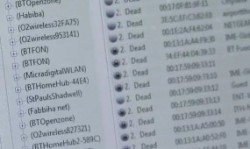UPDATE EU Law Enforcement Agency Warns FREE Public WiFi is Open to Abuse

The boss of Europol‘s cybercrime division, Troels Oerting, has warned that they are seeing an “increase in the misuse” of free public wireless Internet networks (WiFi hotspots). In particular hackers have been known to target them as a means of stealing personal and financial information.
The fact that free public wifi networks, whether hosted in the home or by a local café, might be insecure is nothing new and we’ve covered plenty of similar reports over the past few years. But naturally the frequency of abuse is becoming more prevalent as the service expands.
Advertisement
Unsecured WiFi networks are usually easier to sabotage and sometimes a hacker doesn’t even need to break into the network itself and may simply setup a fake hotspot with a similar name (SSID), which some people will connect to without first checking whether or not the network itself is legitimate.
Troels Oerting said (BBC):
“We have seen an increase in the misuse of wi-fi, in order to steal information, identity or passwords and money from the users who use public or insecure wi-fi connections. We should teach users that they should not address sensitive information while being on an open insecure wi-fi internet.
They should do this from home where they know actually the wi-fi and its security, but not if you are in a coffee shop somewhere you shouldn’t access your bank or do all of these things that actually transfer very sensitive information.”
The current situation is one of the reasons why we prefer Mobile Broadband to public wifi, although if you do wish to connect with a wifi network then there are measures you can take to limit any potential harm. For example, ensuring that your computer’s security settings don’t allow remote users access to your files is a good start.
On top of that we’d recommend purchasing a trustworthy Virtual Private Network (VPN) service, which will allow you to connect via wifi but still have confidence that your data is travelling over a known network instead of the public access point (very useful when abroad too). Meanwhile for home users our older Top 10 Wireless (Wi-Fi) Security Tips article is still largely valid.
UPDATE 12:02pm
Advertisement
Now we can add a reply from security firm F-Secure.
Sean Sullivan, Security Advisor at F-Secure, said:
“Europol has issued a warning due to a growing number of attacks? Better late than never, I suppose. But really, this has been a concern for years — that’s why sensible companies force employees to use VPN connections.
As consumers go — a Firefox plugin called ‘Firesheep’ definitively demonstrated just how utterly insecure Wi-Fi hotspots can be back in 2010. Does insecurity stop me from using open hotspots? Nope, I use free Wi-Fi all the time. And I don’t plan on changing that particular habit anytime soon. But I know it’s not secure — free Wi-Fi hotspots are typically available in public places. That’s public as in not private.
If you want to use an open Wi-Fi hotspot to search for the latest sports scores — go for it. But if you want to check your bank balance, read your email, have a private chat with your friends – get yourself a VPN service.”
Mark is a professional technology writer, IT consultant and computer engineer from Dorset (England), he also founded ISPreview in 1999 and enjoys analysing the latest telecoms and broadband developments. Find me on X (Twitter), Mastodon, Facebook, BlueSky, Threads.net and Linkedin.
« NFU Mutual Warns Education Damaged by Poor Rural Broadband






















































Comments are closed